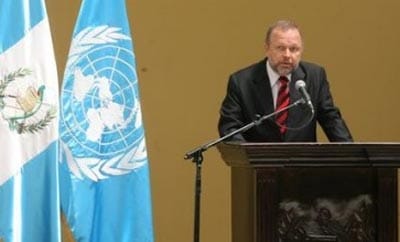The Guatemalan government has opened investigations into 13 of the 18 judges accused of corruption by UN-backed judicial body CICIG, marking a step forward in tackling deeply ingrained corruption.
On February 7, Guatemala’s Public Ministry decided to begin pre-trial investigations into the 13 judges, who the International Commission against Impunity in Guatemala (CICIG) accused of “creating spaces of impunity.”
The CICIG, a United Nations-backed body in charge of providing investigative assistance to Guatemalan government institutions, released the report which triggered the investigations, “The Judges of Impunity,” in November 2012. The organization accused the judges of protecting members of criminal groups and corrupt officials from prosecution, and aiding them by ruling in their favor.
This week, various judges from the judicial branch and three judges from the Second Court of Appeals announced that they would not participate in cases in which the CICIG was involved, citing “serious enmity” between the two bodies, reported Prensa Libre. Three of the appeals court judges are among those who were accused in the November report.
InSight Crime Analysis
The decision to investigate most of the judges identified by CICIG is an important milestone in tackling impunity in Guatemala, and a validation of the CICIG’s work. The group’s mandate is being renewed for another two years from January, and, alongside the progress made by Claudia Paz y Paz in the Attorney General’s Office, Guatemala appears to be making progress in addressing corruption.
However, the problem runs deep in Guatemala, and prosecutors will have to overcome serious challenges if the investigations are to lead to prosecutions, not least the question of whether other judges will be willing to prosecute their colleagues.
The CICIG has run into this problem before, helping bring ex-President Alfonso Portillo to trial on money laundering and embezzlement charges, only to see him acquitted by one of the judges now on their “Judges of Impunity” list.
Ultimately, as CICIG Director Francisco Dall’Anese told InSight Crime last year, if lasting progress is to be made, Guatemala cannot rely on external bodies such as the CICIG.

